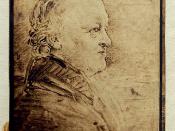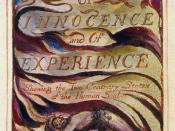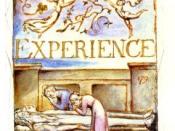Romanticism in Poetry of the 18th Century
A period of passion, simplicity, and raw emotion bursting from its core, Romanticism is a movement enveloping authors, artists, and poets whom were striving for a united sense of clarity and nationalism. Prominent change invokes strong emotion in those affected; when a large part of society is affected many strive for an outlet for their frustration, joy, or despair. The way in which individuals express their innermost feeling commonly coincides with art in any form. William Blake, an influential romantic poet in the late 18th century, portrayed his emotion through many poems inspired by the cruel and unforgiving conditions of the Industrial Revolution in England. Both of Blake's poems entitled "The Chimney Sweeper" exhibit powerful emotion in every line while addressing topics prevalent in the daily lives of the common people. Through the social commentary of Blake and others like him, romanticism urged society to empathize with one another in a raw and unrestrained manner, free from logic and self-doubt.
The use of color imagery in Blake's work appeals to the senses, revealing that the facts of the Industrial Revolution can be felt, rather than learned through ideas of philosophers and scientists. A child, by the name of Tom, has his head shaved, and the narrator of the poem reassures him "[â¦]when your head's bare, You know that the soot cannot spoil your white hair." (Blake Songs of Innocence lines 7-8). The soot is the reality of the cruel conditions these young children face on a daily basis working as chimney sweeps, tainting their youthful innocence. Tom's hair is a strong symbol of purity and the act of shaving it off strips the child from his innocence early, forcing the maturity of a cruel world upon a child whom can barely...


